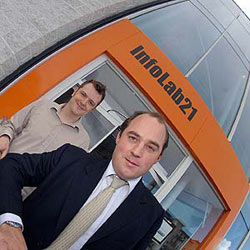Recent Stories
- Businesses urged to tap into science and technology young talent
- Digital relay baton enables remote crowd cheering of athletes
- Health Innovation Campus moves a step closer
- £7.1 million R&D boost for North West businesses
- Centre of excellence created for the next industrial revolution
- Artificial intelligence toolkit spots new child sexual abuse media online
- Strategic partnership set to help plug cyber security skills gap
- What your choice of smartphone says about you
- InfoLabTree: Discover the Story
- novi.digital Launch Event - 'An Event to Help Businesses Grow Online'
RSS Feeds
RSS feeds can deliver the latest InfoLab21 news and events direct to your browser without you having to visit the website.
In most browsers you can click on an RSS link and choose to subscribe to the feed to add it to your favourites or bookmarks.
MP Paired With Scientist
 Dr. Jim Wild and Ben Wallace MP outside InfoLab21
Dr. Jim Wild and Ben Wallace MP outside InfoLab21
A scientist from Lancaster University is to spend a week at the House of Commons shadowing the local MP as part of a scheme to influence research funding at the highest levels.
The Royal Society's MP-Scientist Pairing Scheme aims to forge links between some of the best researchers in the UK and MPs who may have little or no knowledge of science. Dr. Jim Wild from InfoLab21 is to spend a week in Westminster on November 20th as guest of the MP for Lancaster and Wyre Ben Wallace.
He will attend seminars on parliamentary proceedings, sit in on Science and Technology Committees in both the House of Commons and the House of Lords and get the chance to watch Prime Minister's Questions.
The pair also go on reciprocal visits. Dr. Wild will spend a day at Mr Wallace's constituency office attending meetings on local issues. The MP will then be invited to tour InfoLab21, learn about Dr Wild's research in the Department of Communications Systems and witness some experiments.
Economic Benefits
Over 80 MPs have taken part in the scheme so far and Mr Wallace said he was looking forward to it.
"Not only MPs but the public don't understand science and I think it would be good to get to grips with what scientists do and how it's funded. I also want to prepare to push the agenda for Lancaster University and for the science community here.
"One of the successes of Lancaster and Wyre is Lancaster University which has brought enormous economic benefits to my constituency, so if I can bring additional funding to Lancaster instead of a university in another part of the country then I won't have any hesitation in doing so"
Dr Wild, from the Space Plasma Environment and Radio Science group, said he applied to the scheme because he wants to understand how the government allocates funding for scientific research.
"Such fundamental decisions have a massive impact on the grass-roots scientist like myself. Scientists have an obligation to engage in the process of science decision-making within government; if we sit on the sidelines, how can we expect society and the government to understand the importance of funding research in the UK?"
Public Perception
He also wants to improve the public perception of science.
"In a society driven by 24-hour rolling news and newspaper headlines, it sometimes feels like scientists are viewed as boffins in white lab coats who tinker with nature and waste taxpayers' money. Scientists must reflect upon their own role and ask why this is the case.
"Given the massive impact of scientific and technological advances upon our day-to-day lives, I feel very strongly that it is the duty of research-active scientists to engage with the public and government in order to tackle this false perception."
www.dcs.lancs.ac.uk/research/spears
Tue 10 October 2006



